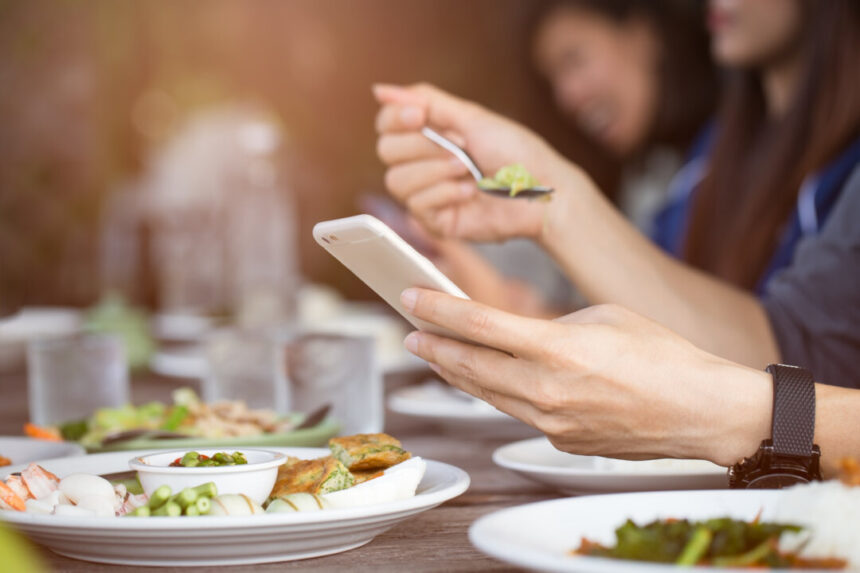Commentary
In the early days, when cellphones were first made available, they were a novelty of the rich. I can remember sitting at a diner and some guy was carrying on a conversation into a phone without wires from his table. He was speaking loudly and laughing and annoying everyone else.
My thought: This technology is a dream come true, but we do not yet have social norms for these things. It will likely take many years to get there.
I knew for sure that there would come a time when the court of taste and manners would rule against speaking loudly on a cellphone in a public restaurant.
By now, that is surely known. I cannot remember seeing this in a very long time. There is no law against and restaurants do not usually have to explain that this is not allowed. It is simply considered rude, and that is all that is necessary to make the practice Verboten.
Albert Jay Nock, one of my favorite interwar authors, wrote about the power of social expectations and informal rules. He said the court of taste and manners in a free society would guide the operation of behavior, and this “court” would have a much larger role in society than law, legislation, or religion. This is surely true in a social order that is civilized.
With new tools and toys, rules must adapt. This will happen even if slowly. The formation of new rules comes with emulation. When we see someone doing something that bugs us, we make a mental note not to do that. When people do things that elicit respect, we make notes of that, too. Gradually, the knowledge spreads and becomes instantiated in habits and norms.
Sure enough, the etiquette surrounding cellphones has become ever stricter.
For example, a few years back, I was at a dinner party and took out my phone to see why it was buzzing. It was a message that I read and then clicked on a link and, the next thing I know, I was engrossed in some content on my phone and started ignoring the conversation.
After I put my phone back in my pocket I looked up to see people staring at me disapprovingly. It was at that moment that I realized: We are in a new world now and the general expectations concerning appropriate phone use are changing.
Today it is usually and rightly considered uncouth to take your phone out at dinner of any sort or even at a cocktail party to which you have been invited. I rarely see it now. You say that you need it just for emergencies? Well, you can set your phone for a special buzz for the special person and make an exception. That is fine. But you might be best to excuse yourself to use your phone.
A year or so ago, I was invited to speak at a special club in some city (I cannot remember which) and took a call. I was walking around the club talking. I thought this was fine because there was no one around. But then a man in black tie came up to me and said this was not allowed, that they have special phone booths for this. I was stunned. I entered a phone booth and finished my conversation.
I assume that this is true in any private club now.
It is certainly true when you are in someone else’s home. The phone gets buried out of sight and you don’t pull it out for the entire evening. That’s where we stand today. I would say that this is exactly right. Digital addiction is real and nothing says “I don’t like you” like pulling out your phone during a conversation.
This rule seems to have emerged in the past few years, probably during lockdowns when people were spending so much time indoors with others. No one announced it. It just became a thing for people. Sometimes it is rooted in privacy concerns given the widespread belief that these things are simply tools of surveillance and spying. No one likes that. It also traces to a general sense that if you are somewhere, you should be there and not somewhere else in your head.
I’m also hearing fewer announcements at concerts and church and so on to turn off your cellphone. These days, people are right to keep their phones on vibrate except in special places. Vibrate is enough. The days of sitting quietly only to have someone’s phone scream “Everybody dance now!” are largely over.
It’s the same with listening to music. Earbuds are essential if you must listen to music.
I have the impression that we still are not there with etiquette concerning taking photographs. In large public spaces with a public personality, it is unavoidable. But for regular people in private places, taking photos without permission is really a violation of privacy. It is certainly not charming. I have had someone show me a picture they had just taken of me and I felt a tinge of anger about the whole thing. It’s just wrong.
The generalized rule should be: Never take a photograph of a person without permission. If a person is giving a public speech or otherwise is a known figure, the permission is implicit. Otherwise, in private situations and casual locations, it should be considered uncouth and plainly violative to snap photos much less publicly post them without permission.
I’m also learning something else. I’ve typically kept my phone in my coat pocket with the top peeking out over the top. That’s the place where the pocket square usually goes.
It has become quite alarming for some individuals to realize that their smartphone cameras may be surveilling them, especially if the camera holes are visible. To combat this, I have started keeping my phone in my left pocket inside my coat, completely out of sight. This simple change in habit ensures that people are not reminded of the device’s presence.
This issue highlights a broader concern surrounding smartphones. Once considered trendy and a status symbol, smartphones were even seen as companions. However, this perception has shifted as we have become aware of the surveillance capabilities, fake news notifications, and data collection practices of these devices. They are now viewed as necessary but potentially invasive tools, posing a threat to privacy and freedom.
The shift in attitude towards smartphones has been significant in recent years. While they are ubiquitous and often used for entertainment during travel, they have also contributed to a decline in face-to-face interactions and genuine human connection. The smartphone has been criticized for intruding on personal spaces, disrupting social gatherings, and detracting from the quality of life.
In response to these concerns, many individuals, including myself, have chosen to limit notifications, restrict app usage, and prioritize real-world interactions over screen time. The evolving norms and expectations surrounding smartphone use reflect a growing awareness of the potential drawbacks of these devices.
The evolution of smartphones from coveted gadgets to scrutinized tools underscores the need for a balanced approach to their use. By being mindful of our smartphone habits and setting boundaries, we can mitigate some of the negative impacts associated with these devices.
Please note that the views expressed in this article are the opinions of the author and do not necessarily reflect those of The Epoch Times.
Source link







